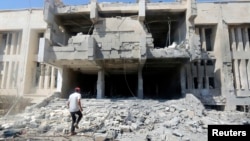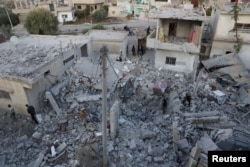A coalition of medical aid and relief organizations in Syria reports an alarming escalation in attacks on hospitals and medical personnel in the past two months.
The activists say hospitals, health workers and ambulances in non-government-controlled areas in Syria have been targeted as a tool of war since the beginning of the crisis in 2011. They say doctors have been detained, tortured, and killed; hospitals and ambulances have been systematically targeted by airstrikes and shelling; and medical supplies have been looted.
Since the start of the war, 687 medical personnel have been killed — including 254 doctors — and 329 medical facilities have been attacked, according to the activists. In addition, their statistics show 90 percent of doctors have left Syria, and those who remain fear for their lives.
'High risk of malnutrition'
Tawfik Chamas, president of the Union of Medical Care and Relief Organizations, says the Syrian government is responsible for 95 percent of the attacks and killings. According to his numbers, a sharp increase in the scope and violence in Syria has caused more than 100,000 people to become displaced in the suburbs of Aleppo and Hama in October alone, with more than 11 million Syrians in need of medical care.
"More than three million children, pregnant women and lactating women are at high risk of malnutrition,” he said. “We have more than half-a-million pregnant women who are displaced because of the war. … Children inside Syria are dying even from upper respiratory infections like bronchitis because of lack of resources, of lack of experts who can treat those conditions."
Unprecedented numbers
Leonard Rubenstein, director of the Program on Human Rights, Health and Conflict at Johns Hopkins, has tracked health conditions in conflict situations for 20 years and has investigated regions such as Chechnya, Gaza, and the Balkans.
And yet, he says, he has never seen a level of destruction such as that in Syria.
"Nowhere else in memory, certainly not ever documented before, had there been 200 separate health facilities in a single country subjected to bombing or missile attacks,” he said. “Nowhere have we had to count the number of health professionals killed not in dozens, but in many hundreds."
The situation has gotten worse since the Russian intervention in the war, Rubenstein says, citing numbers from the Carter Center in the United States. Those reports found that 85 percent of Russia's air attacks are on areas controlled by Syrian opposition forces, not by the so-called Islamic State.
In addition, approximately 10 hospitals and health facilities have been hit by Russian strikes.





